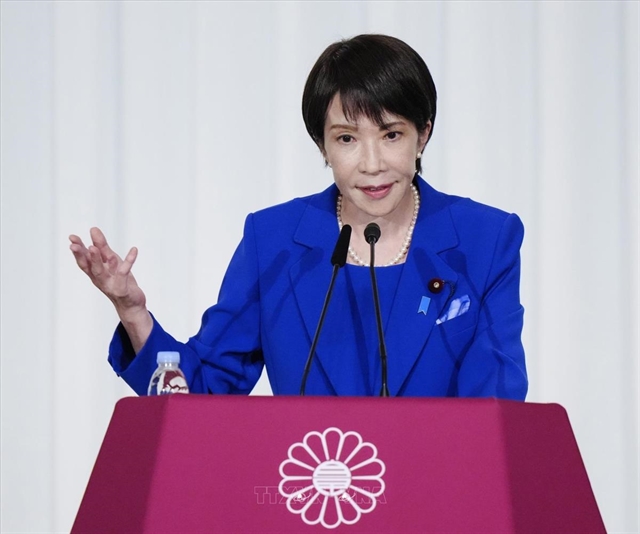 Economy
Economy

BUSINESS BEAT
The chairman of a company whose annual exports are worth nearly US$100 million, half of it to the US, said many Vietnamese exporters are deeply worried about the likely policies of US President-elect Donald Trump.
He said the US’s political and economic policies on global trade, taxation and immigration could change significantly, with unpredictable consequences.
The new US administration could pull out of the Trans-Pacific Partnership (TPP), and other free trade agreements may be re-negotiated.
Measures to protect the US economy such as higher anti-dumping duties and technical barriers to trade could be taken, he said.
The CEOs of many other Vietnamese companies have expressed similar views, saying that three Vietnamese industries -- fisheries, steel and electronic components -- are likely to be affected strongly if Trump’s protectionist policies are adopted.
The US now is Việt Nam’s biggest fisheries export market, buying up to 40 per cent of its shrimp exports.
To cope with the rapid increase in the import of this Vietnamese item, in September the US improved new anti-dumping duties on shrimp that are five times the old rate.
Soon the US is also expected to put up technical barriers against imported fisheries products to protect local producers in addition to existing barriers like anti-dumping duties, and regulations related to origin of products and use of chemicals and antibiotics.
It is feared that US firms’demands for anti-dumping action will get more traction since the new president is a businessman.
In addition to concerns about the US’s protectionist policies, Vietnamese firms are also worried about a possibility of a falling dollar due to the US’s economic instability expected to be caused by the newly-elected US president’s new policies.
This would make their products more expensive because the Vietnamese Government has adopted a policy of keeping the đồng steady.
Analysts concurred, saying Vietnamese exports would face many difficulties since the US is likely to make many policy changes, particularly economic.
Vietnamese enterprises need to sharpen their competitive edge as well as thoroughly understand US rules to cope, they said.
But they also suggested that Vietnamese exporters need to diversify their export markets and pay more attention to the domestic market.
Gold becomes safe haven amid uncertainty
After jumping by about VNĐ1 million per tael (37.5gm) on November 9 following the election of Donald Trump as the next US president, Vietnamese gold prices fell by VNĐ260,000 to around VNĐ36.7 million a day later.
The drop in prices continued the following days.
SJC gold declined to VNĐ35.73 million per tael last Friday (November 17)
However, there has been a sharp increase in buying during the same period.
Analysts said the sharp increase in demand is due to a perception that the global gold price could rise again and the greenback could become unstable.
The rise in demand has also caused the gap between domestic and global gold prices to widen significantly.
The global price is now around VNĐ34.61 million per tael, meaning the difference is a whopping VNĐ2.4 million.
Analysts do not expect gold prices to change much in the near future since the financial markets have already settled down again after volatility following the US elections.
Investors have again returned to watching economic indicators and the monetary policies of central banks, particularly that of the US Federal Reserve, which is expected to hike interest rates in December, causing the dollar to appreciate.
Some others said that it was difficult to predict the domestic gold prices because although the domestic gold rate was recently affected by the global price but this influence was inconsiderable.
This is because the Government does not allow import of gold.
In face of the uncertainty, analysts said gold investors should closely watch the market and be careful in making investment decisions.
Interest rates edge up
In recent weeks the interest rates in the inter-bank market have showed signs of rising, which partly indicates an increasing demand for funds though liquidity is plentiful.
According to the Việt Nam Investment Development Group’s Economics Research Centre, the number of transactions has started to increase on the inter-bank market.
As a result, the interest rates on đồng loans increased significantly last week by an estimated 36-48 basis points.
The overnight rate has risen to 1.26 per cent per year, the one-week rate to 1.34 per cent, the two-week rate to 1.54 per cent and the one-month rate to 1.98 per cent.
Analysts partially attributed this to banks seeking to raise funds since demand usually spikes in the last few months of the year.
Besides, despite being a season of plenty, some credit institutions lack liquidity and want to shore up their cash positions to preclude any shortage.
The fact that many people withdrew their savings from banks to buy gold after the US presidential election could also be a reason for the rising inter-bank interest rates.
The higher interest rates have affected the đồng-dollar exchange rate.
In the middle of last week the greenback rose sharply against the đồng also partly due to a widening gap between domestic and global gold prices.
On Tuesday afternoon the dollar climbed from VNĐ22,340-22,342 to VNĐ22,352-22,355.
The reference rate set by the State Bank of Việt Nam was VNĐ19 up at VNĐ22,089. Banks can trade at 3 per cent on either side of the rate, meaning between VNĐ21,432 and VNĐ22,749.
Financial organisations forecast the reference rate would hover in the range of VNĐ22,320-22,370 in the coming days.
As a result, the inter-bank interest rates on dollar loans also rose, with the rate on overnight loans edging up to 0.58 per cent per year.
Banks said that the exchange rate depends on the dollar supply and demand. But though the supply is ample now, banks are worried the greenback could appreciate against the đồng at the end of the year due to rising demand for making import payments.
Besides, the dollar has strengthened against other currencies on fears Donald Trump’s policies could spark off inflation and cause interest rates to be hiked. — VNS




